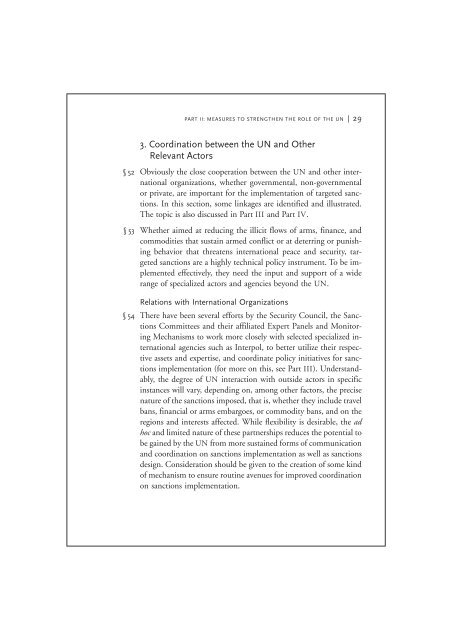Making Targeted Sanctions Effective - Small Arms Survey
Making Targeted Sanctions Effective - Small Arms Survey
Making Targeted Sanctions Effective - Small Arms Survey
Create successful ePaper yourself
Turn your PDF publications into a flip-book with our unique Google optimized e-Paper software.
PART II: MEASURES TO STRENGTHEN THE ROLE OF THE UN | 29<br />
3. Coordination between the UN and Other<br />
Relevant Actors<br />
§ 52<br />
§ 53<br />
§ 54<br />
Obviously the close cooperation between the UN and other international<br />
organizations, whether governmental, non-governmental<br />
or private, are important for the implementation of targeted sanctions.<br />
In this section, some linkages are identified and illustrated.<br />
The topic is also discussed in Part III and Part IV.<br />
Whether aimed at reducing the illicit flows of arms, finance, and<br />
commodities that sustain armed conflict or at deterring or punishing<br />
behavior that threatens international peace and security, targeted<br />
sanctions are a highly technical policy instrument. To be implemented<br />
effectively, they need the input and support of a wide<br />
range of specialized actors and agencies beyond the UN.<br />
Relations with International Organizations<br />
There have been several efforts by the Security Council, the <strong>Sanctions</strong><br />
Committees and their affiliated Expert Panels and Monitoring<br />
Mechanisms to work more closely with selected specialized international<br />
agencies such as Interpol, to better utilize their respective<br />
assets and expertise, and coordinate policy initiatives for sanctions<br />
implementation (for more on this, see Part III). Understandably,<br />
the degree of UN interaction with outside actors in specific<br />
instances will vary, depending on, among other factors, the precise<br />
nature of the sanctions imposed, that is, whether they include travel<br />
bans, financial or arms embargoes, or commodity bans, and on the<br />
regions and interests affected. While flexibility is desirable, the ad<br />
hoc and limited nature of these partnerships reduces the potential to<br />
be gained by the UN from more sustained forms of communication<br />
and coordination on sanctions implementation as well as sanctions<br />
design. Consideration should be given to the creation of some kind<br />
of mechanism to ensure routine avenues for improved coordination<br />
on sanctions implementation.
















